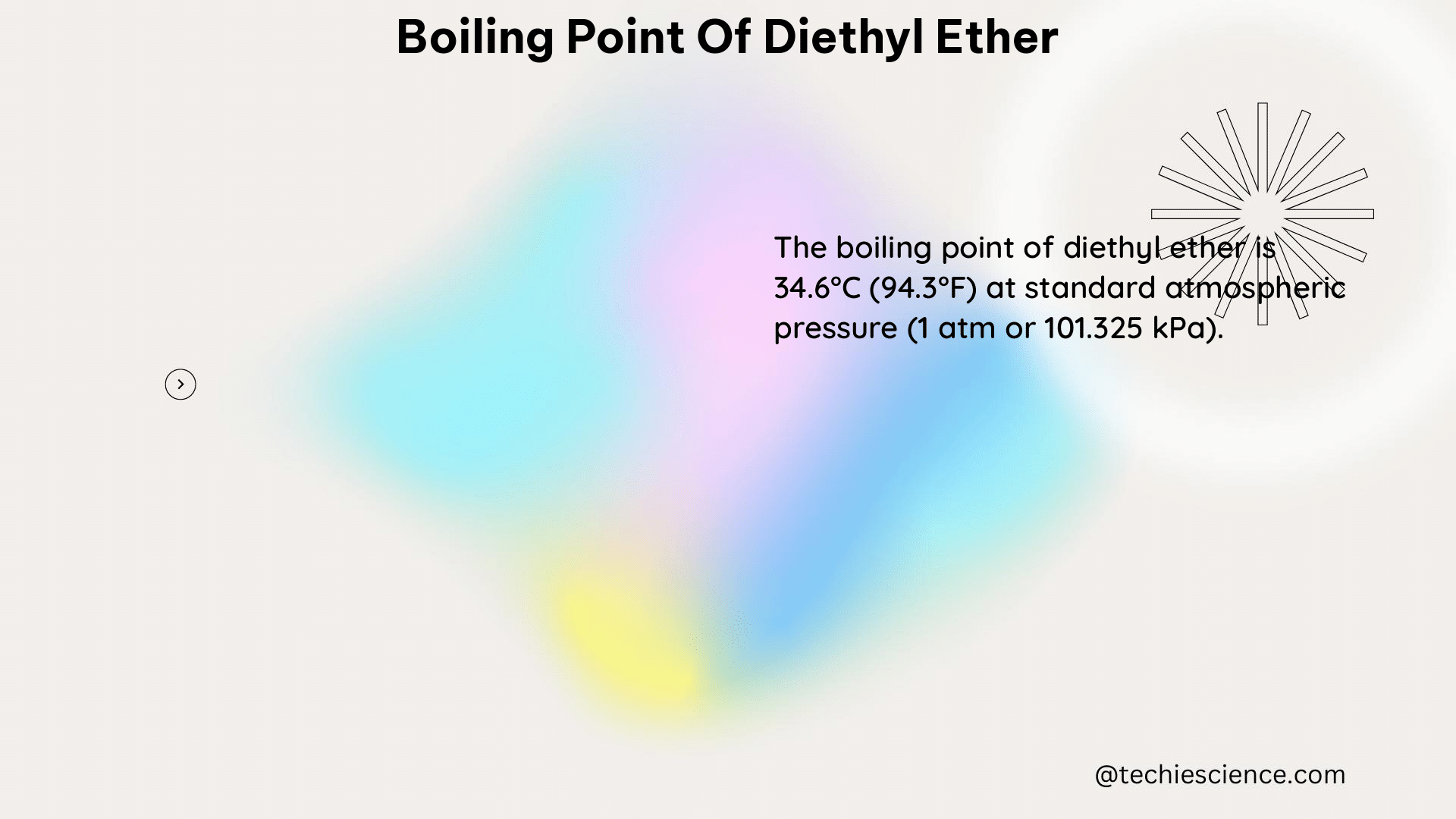Diethyl ether, with the chemical formula CH3CH2OCH2CH3, is a widely used solvent in various chemical and industrial applications. Its boiling point is a crucial physical property that plays a significant role in understanding and predicting the behavior of this compound. In this comprehensive guide, we will delve into the intricacies of the boiling point of diethyl ether, providing a wealth of technical details and practical insights for science students and professionals.
Understanding the Boiling Point of Diethyl Ether
The boiling point of diethyl ether is the temperature at which the vapor pressure of the liquid equals the pressure surrounding the liquid, and bubbles of vapor form inside the liquid. This temperature is a characteristic property of the substance and is influenced by various factors, including the strength of intermolecular forces, the molar mass, and the presence of impurities.
According to multiple reliable sources, the boiling point of pure diethyl ether is 34.6°C (94.28°F) at standard atmospheric pressure (760 mmHg). This value is based on the data reported by the National Toxicology Program (NTP) in 1992. The boiling point range of diethyl ether is typically reported as 34-35°C (93.2-95°F) at 760 mmHg.
Factors Affecting the Boiling Point of Diethyl Ether

The boiling point of diethyl ether can be influenced by several factors, including:
-
Purity of the Sample: The presence of impurities in the diethyl ether sample can slightly alter its boiling point. For instance, the boiling point of anhydrous diethyl ether is reported to be 34.4°C (93.92°F) at 760 mmHg, while the boiling point of diethyl ether stabilized with BHT (butylated hydroxytoluene) is reported to be 34.5-34.7°C (94.1-94.46°F) at 760 mmHg.
-
Pressure: The boiling point of diethyl ether, like any other substance, is directly related to the surrounding pressure. As the pressure increases, the boiling point also increases, and vice versa. This relationship can be described by the Clausius-Clapeyron equation:
ln(P2/P1) = (ΔHvap/R) * (1/T1 - 1/T2)
Where:
– P1 and P2 are the vapor pressures at temperatures T1 and T2, respectively
– ΔHvap is the molar enthalpy of vaporization
– R is the universal gas constant
-
Intermolecular Forces: The strength of intermolecular forces, such as van der Waals forces and hydrogen bonding, can influence the boiling point of diethyl ether. Stronger intermolecular forces generally result in higher boiling points.
-
Molar Mass: The molar mass of a substance is also a factor that affects its boiling point. Heavier molecules typically have higher boiling points due to the increased van der Waals forces between them.
Thermodynamic Properties of Diethyl Ether
In addition to its boiling point, diethyl ether has several other important thermodynamic properties that are relevant in chemistry and materials science:
-
Heat of Vaporization: The heat of vaporization of diethyl ether is 26.7 kJ/mol. This value represents the amount of energy required to convert one mole of the liquid into its gaseous state at the boiling point.
-
Molar Mass: The molar mass of diethyl ether is 90.1 g/mol. This property is essential for calculating various thermodynamic quantities, such as entropy and enthalpy changes in chemical reactions.
-
Vapor Pressure: The vapor pressure of diethyl ether is an important property that determines its volatility and flammability. The Antoine equation can be used to calculate the vapor pressure of diethyl ether at different temperatures:
log10(P) = A - B / (T + C)
Where:
– P is the vapor pressure in mmHg
– T is the absolute temperature in Kelvin
– A, B, and C are Antoine constants specific to diethyl ether
The Antoine constants for diethyl ether are: A = 4.06531, B = 1165.640, and C = -34.29.
Applications and Considerations
Diethyl ether’s boiling point and other physical properties make it a valuable solvent in various applications, including:
-
Chemical Reactions: Diethyl ether is commonly used as a solvent in organic synthesis reactions, taking advantage of its high volatility and low polarity.
-
Anesthesia: Diethyl ether was historically used as an anesthetic in medical procedures due to its ability to induce unconsciousness when inhaled.
-
Fuel: Diethyl ether has been used as a fuel additive in internal combustion engines, particularly in racing applications, due to its high octane rating and ability to increase engine power.
However, it is important to note that diethyl ether is highly flammable and can form explosive mixtures with air. Proper safety precautions must be taken when handling and using this compound.
Conclusion
The boiling point of diethyl ether is a crucial physical property that plays a significant role in understanding and predicting the behavior of this versatile compound. By delving into the technical details and factors affecting the boiling point, as well as the related thermodynamic properties, this comprehensive guide provides a valuable resource for science students and professionals working with diethyl ether.
References:
- Diethyl Ether. (n.d.). In InfoPlease. Retrieved from https://www.infoplease.com/science/chemistry/compounds/diethyl-ether
- Diethyl Ether – C4H10O. (n.d.). In PubChem. Retrieved from https://pubchem.ncbi.nlm.nih.gov/compound/Diethyl-Ether
- The boiling point of diethyl ether, CH3CH2OCH2CH3, is 34.500 C at 1 atm. (n.d.). In Homework Study. Retrieved from https://homework.study.com/explanation/the-boiling-point-of-diethyl-ether-ch3ch2och2ch3-is-34-500-c-at-1-atm-kb-of-diethyl-ether-2-02-c-m-in-a-laboratory-experiment-students-synthesized-a-new-compound-and-found-that-when-12-58-grams-of-the-compound-were-dissolved-in-216-6-grams-of-diet.html
- Diethyl Ether Pure Boiling range 34-36°C 2.5L. (n.d.). In Camlab. Retrieved from https://www.camlab.co.uk/diethyl-ether-pure-boiling-range-34-36-c-2-5l
- Diethyl ether (C4H10O2, MW = 90.1 g/mol) has a boiling point of 35.6oC and heat of vaporization of 26.7 kJ/mol. (n.d.). In Pearson. Retrieved from https://www.pearson.com/channels/general-chemistry/asset/1af76ea1/diethyl-ether-c4h10o2-mw-90-1-g-mol-has-a-boiling-point-of-35-6oc-and-heat-of-va

The lambdageeks.com Core SME Team is a group of experienced subject matter experts from diverse scientific and technical fields including Physics, Chemistry, Technology,Electronics & Electrical Engineering, Automotive, Mechanical Engineering. Our team collaborates to create high-quality, well-researched articles on a wide range of science and technology topics for the lambdageeks.com website.
All Our Senior SME are having more than 7 Years of experience in the respective fields . They are either Working Industry Professionals or assocaited With different Universities. Refer Our Authors Page to get to know About our Core SMEs.